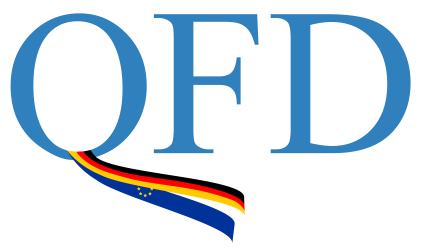

December 9th – 10th, 2021
Contributions: Cases, Workshops, Scientific Papers
The conference is delivered in a virtual format only. We will arrange time slots which will be attractive for the respective speakers and attendees, taking into accout the different time zones (see program for some more details). This call requests three different types of contributions:
- Practical cases providing insights into integrative approaches; cases for digital products and services are highly welcome.
- Workshops such as webinars conveying integrative methods and
- Scientific papers enquiring into research questions concerning the integration of product managementmethods which will be reviewed according to academic standards and published in the conference proceedings.
Please submit your proposal as indicated below to symposium@qfd-id.de not later than 15.10.2021 31.10.2021 (final extension!). Further submission guidelines (formatting etc.) will follow in the next days on the website. Furthermore, we plan to use easychair as submission portal, but up to then, please use the above E-Mail-adress for questions and submissions.
Host: QFD-Institut Deutschland e.V.
Chair: Prof. Dr. Wolfram Pietsch, symposium@qfd-id.de
Partner: University of Stuttgart, University of Kassel, University of applied Sciences Aachen, International Council for QFD
Important Dates
- October
15th31st, 2021 (final extension): Deadline Abstract - Feedback/Notification: within 2 weeks after submission
- Submission of final contribution:
November, 20th,December, 1st, 2021
Submission Details
You have the choice to contribute to ISQFD ’21 in three different tracks.
All contributions must have a qualified methodological bases founded on best practices and or the knowledge in a certain community but should be open for challenging, elaborating or pursuing the integration of product management.
- Practical case – topic (context/challenge), methodological keywords, outline
- Workshop – learning goal, duration and form, outline, outcome
- Academic paper (double blind review) – research goal, methods and outcome, summary
Format
Abstracts and Full papers must be submitted electronically and in the following format and structure.
- Word Format: *.doc, *.docx
- Length
- Abstract should have about 500 words
- Full Paper Submissions should have at least 3000 words and should not exceed 6000 words including all text, references, tables etc.
- Do not number pages
- Single spacing
- Font Times New Roman 12pt
- References within the text should be authors last name followed by year of publication all in round brackets (Akao, 1968)
- Tables must be numbered consecutively within the main text using a title and roman numerals (I, II, …)
- Figures, diagrams, charts must be numbered consecutively within the main text using a title and arabic numerals (1, 2, …)
- Avoid footnotes and endnotes
- The reference list at the end of the paper should be complete and in Harvard style using an alphabetical list by author
Examples of Harvard style:
- For books: Surname, Initials, (year), Title of book, Publisher, Place of publication
- Akao, Y. (1988), Hinshitsu tenkai katsuyo no jissai, Japanese Standards Association, Tokyo
- For book chapters: Surname, Initials, (year), „Chapter title“, Editor’s surname, Initials, Title of book, Publisher, Place of publication
- For journals: Surname, Initals, (year), „Title of article“, Journal name, Volume, Number, Pages
Abstract Structure
Please use as a guidance the following abstract-template.
- Paper Title
- Autobiographical note for each author
- Full name
- Academic title
- Organization (University, Company)
- Department and work/reseach areas
- E-Mail adress
- Postal adress
- Paper type (scientific or practical/case study)
- Heading ‚Abstract‘
- Sub-headings
- Purpose/Motivation
- Methodology/Approach
- Findings and Research Limitation
- Originality/Value of paper
- Up to six Keywords
Full Paper Structure
Please use as a guidance the following full-paper-template.
- Paper Title
- Autobiographical note for each author
- Full name
- Academic title
- Organization (University, Company)
- Department and work/reseach areas
- E-Mail adress
- Postal adress
- Paper type (scientific or practical/case study)
- Abstract
- 4-6 Keywords
- Paper Text
- List of references
